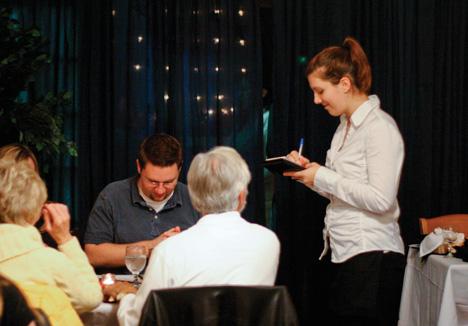Spice Box offers experience, fine cuisine
October 31, 2006
The tables were set, the candles were lit and operatic music played over the speakers at the Spice Box, a student-run restaurant. Two small Italian flags donned each table, while a larger flag hung behind the bar.
Joe DiTola, senior in ACES and meal manager for the evening at Spice Box, a fully functioning restaurant on the second floor of Bevier Hall featuring a different theme for every meal, demonstrated the pronunciation of menu items to staff. It was about an hour before the first reservations were scheduled to arrive. The staff met to go over everything from the price of beverages to the availability of a vegetarian soup.
On most Friday evenings and occasionally on Tuesdays, University students in the Food Science and Human Nutrition’s Hospitality Management program run the Spice Box.
“It’s basically your dream come true for the night – it’s your restaurant,” Jill Cycyota, senior in ACES, said. “You can make your servers wear whatever you want, you can decorate the tables however you want, the menu and everything is all up to you. You’re given complete control.”
The restaurant is part of a required course for seniors in the Hospitality Management program called Fine Dining Management. Each student is the meal manager for one night, which involves far more than one night of work.
Get The Daily Illini in your inbox!
“To do a really good job, a thorough job, I’d say it probably takes you two or three months to prepare,” Jon Barnett, senior in ACES said.
The meal manager has to decide on a theme, plan the menu items and make sure the night will be financially viable – before making sure everything runs smoothly on the night itself.
“You have to figure out how much each ingredient costs and you’ve got to add them all up for each menu item … so you can decide what you’re going to sell it for,” Barnett said.
The meal manager does not do all the work alone. In addition to the servers, there is a front-of-the-house manager, production manager and financial manager, as well as a visiting chef.
The role of the visiting chef is not always the same; sometimes he is there on the night of the meal to help cook and sometimes he helps plan the menu.
“For my meal, I thought I had a good menu, but then when you add in a professional chef – they know things. … One little twist that they’ll do will make it 100 times better,” Barnett said.
The University seniors are also required to fill each of the four manager positions once. For DiTola, his meal was a preparation for the future.
“My goal is to open an Italian restaurant,” he said. “I figured … I might as well start now.”
DiTola’s menu included dishes from nine regions in Italy.
Barnett said the Spice Box garners about 130-140 reservations on a typical Friday night.
“We get a good response from the public and I think it’s a very good learning experience,” said Jill North, professor for Fine Dining Management. “It takes everything they’ve learned over the four years and allows them to apply it in a realistic setting.”







